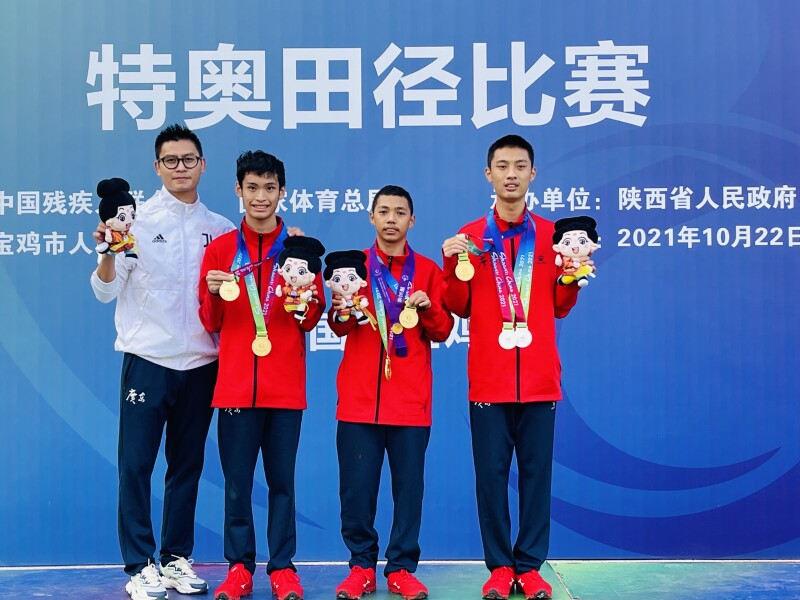This interview is available in both Chinese and English (below).
特奥东亚区教练彭绍健详细介绍了他在中国特殊教育学校担任教练的经历,并分享了如何通过成为一名更好的教练,让他能够更好地帮助他所教练的运动员和学生。
Coach Pen Shaojin - 中国广州市越秀区启智学校 彭少健
1. 你为什么决定成为一名教练/特教老师?
我喜欢这些孩子们,也热爱这份教师的职业。
2. 你为什么要成为一名特教老师/执教你所从事的运动?你喜欢这项工作/运动的什么?
我自小就喜欢运动,特别是踢足球时,特别开心与享受。
这份工作,能帮助这些孩子们成长,使我感到十分有意义。
3. 您每周指导您的学生/团队/运动员多少次?
1-2次,每次90分钟,分别是周六上午9:00 – 10:30及周三下午14:30 – 16:00
4. 为什么体育对你和你执教的运动员很重要?
首先体育或运动,就能够产生多巴胺,使人感到快乐,其次执教运动员,能帮助他们成长,同时让我感受到很大的成就感,及让我很开心。
5. 做为一名教练,在特奥的活动中,你对自己有什么了解?
首先自己必须是真心真意很诚恳的接纳与包容每一位运动员\学生的特点,其次要掌握与不断学习教学技巧、提升特奥运动的专业知识,最后要让自己与他们融入在一个团体之中,在快乐的基础上共同成长。
6. 您能否举例说明您的学生/运动员的社交和情绪健康(自信、社会包容、压力管理)如何因您的训练而得到改善?
学生在训练时不能仅是提升运动技能,更应该提升他们自信与社交沟通能力,例如:刚来的学生会比较害羞或胆小,我会安排队长多带着他一起训练促进交流,另外在训练中,会多组织一些有趣的活动来相互认识,破冰。还有包括在训练时或比赛时,出现失误大家都相互击掌、拍拍肩膀相互鼓励。
7. 你是如何在运动场外支持你的学生/队员融入和促进社会包容的?
在训练休息时或准备前期,见面我都会咨询或了解他们最近的现状,当遇到困难时,会给予一些建议与鼓励。如有更特别的事情,我也会主动跟他父母做好一些沟通。每次训练完后,都会安排一些时间,让大家相互分享最近的一些趣事,以及最近过得如何,通过大家相互信任与沟通,提升融入社会包容,解决社会或工作的困难。
8. 请描述你是如何支持你的学生/运动员在训练内外遵循健康和积极的生活方式的?
有必要时,我们会根据学生训练时的状态,了解到他是否处于遵循健康和积极的生活,如果发现比较槽糕,会尝试停止他的训练计划,并让他了解到遵循健康和积极的生活的重要性。另外有必要时,也会尝试听听他的解释以及咨询了解他的照顾者,他最近状况是否生病。
9. 在你的执教生涯中,你的执教理念发生了怎样的变化?或者从你开始参与特奥活动以来?
我从2008年8月大学毕业后,开始参与特奥运动的执教,早期对于特奥的信念理解不够深入,仅仅关注队伍是否能取得成绩(冠军、金牌)。但在2010年8月份开始,在执教第三年开始觉得,学生们在社交沟通、自信、建立友谊、自我解决困难能力等方面比较成绩而言,更为重要。因为冠军或许只有一个,但生活、成长、挑战或许每天都要面对或发生,结合深入理解特奥运动的信念后,所以让我对于特奥的理解有很多的转变,也十分荣幸有很多学习机会使我及学生得到更多的进步。谢谢
——-
Special Olympics East Asia coach, Peng Shaojian, details his experience of being a coach at a special education school in China, sharing how by becoming a better coach himself, he can be better equipped to help the athletes and students he coaches.
Coach Peng Shaojian - Yuexiu Special Education School in Guangzhou, China
1. Why did you decide you wanted to be a coach?
I love these kids and I love teaching.
2. Why do you coach the sport that you do? What do you like about this sport?
I have been keen on sports since childhood, especially playing football, which makes me feel happy. This job, helping these kids grow up, makes me feel very meaningful.
3. How many times per week do you coach your team/athlete?
Twice a week, about 90 minutes each time. 9:00 – 10:30 Saturday morning and 14:30 – 16:00 Wednesday afternoon.
4. Why is sport important to you and the athletes you coach?
Firstly, sports can produce dopamine and make people feel happy. Secondly, coaching athletes can help them grow, and at the same time, I feel a great sense of accomplishment, and this makes me very happy.
5. What have you learned about yourself as a coach, working in Special Olympics?
First, we must sincerely accept and tolerate the characteristics of each athlete/student. Secondly, we must master and continue to learn teaching skills, improve the professional knowledge of Special Olympic sports, and finally integrate them and Unified partners, as well as ourselves into a group, and grow together on the basis of happiness.
6. Can you give an example of how your athletes have improved their ability to work with others/teamwork, at home training habits, leadership skills, etc. and how you have encouraged them to be accountable for their own performances and training?
During the training, students should not only improve their sports skills, but also improve their self-confidence and social communication skills. For example, if the newly arrived students are shy or timid, I will arrange for the captain to take them to train together more often to promote communication. In addition, during the training, I will organize more interesting activities to get all participants to know each other and break the ice. In addition, during training or during games, no matter winning or losing, everyone gives each other high fives, pat on the shoulder and encouragement.
7. Describe how you have supported your athletes to follow a healthy and active lifestyle in or outside of practice?
During training breaks or preparation, I would consult or learn about their recent status when I met them and give some advice and encouragement when they encountered difficulties. If necessary, I will take the initiative to communicate with his parents. After each training, we will arrange some time for everyone to share some interesting things and how they are doing recently. Through mutual trust and communication, we can enhance social inclusion and solve social or work difficulties.
8. Describe how you have supported your athletes to follow a healthy and active lifestyle in or outside of practice?
If necessary, we will find out whether the student is following a healthy and active life based on the state of training. If it is not good, we will try to stop his training program and let him understand the importance of following a healthy and active life. In addition, if necessary, we will try to listen to his statement and consult his caregivers to find out his health state.
9. How has your coaching philosophy changed over your coaching career? Or since you started coaching in Special Olympics?
After I graduated from university in August 2008, I began to participate in the coaching of Special Olympics. In the early days, I did not have a deep understanding of the core concept in Special Olympics, and only focused on whether the team could achieve good results (championship, gold medal). However, starting in August 2010, in the third year of teaching, I began to feel that students' social communication, self-confidence, friendship building, and self-solving ability were more important than results. Because they may become the champion for once, but life, growth, and challenges compose their daily life. Combined with the deep understanding of the Special Olympics movement, my understanding of Special Olympics activities and coaching has changed a lot, and I am grateful for having many learning opportunities to help my students grow.










